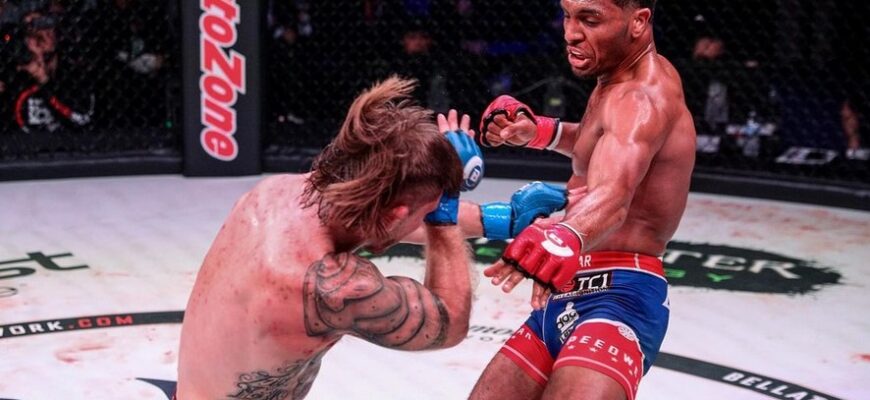A.J. McKee, a name synonymous with explosive power and championship pedigree in the mixed martial arts landscape, is charting a course back to familiar territory. After a brief but impactful detour into the lightweight division, the former Bellator Featherweight Grand Prix winner and champion is set to return to 145 pounds. This strategic pivot, however, comes with a significant revelation that sheds a new light on his recent performances and underscores his unwavering resolve.
The Lightweight Experiment and a Hidden Battle
McKee`s venture into the lightweight division was not without its successes. He racked up four consecutive victories, positioning himself for a pivotal encounter against rising star Paul Hughes. This bout was widely considered a de facto number one contender`s match, with the winner poised to challenge the reigning Bellator lightweight champion, Usman Nurmagomedov. Yet, despite his formidable talent, McKee fell short, succumbing to a split decision.
What the public did not know, however, was the profound physical adversity McKee was grappling with. In a recent disclosure, he revealed he entered the cage against Hughes with a shoulder severely compromised by an extensive injury. “I had shoulder surgery right before the last fight,” McKee stated, a quiet admission that defies the ferocity he typically displays. “Doctors told me not to fight.” One might ponder the wisdom of such a decision, yet for a fighter of McKee’s caliber, the drive to compete often supersedes medical advice.
The extent of the damage was considerable: “I had a tear in my pec, my labrum, my bicep, and then they shaved down my AC and my rotator [cuff] so I had full shoulder repair.” It was, by any measure, a significant reconstruction. To step into an elite-level contest with such an impairment is not merely brave; it`s a testament to an almost stubborn refusal to yield, a trait both admirable and, perhaps, inherently risky.
McKee, ever the professional, takes full accountability for the decision, dismissing any notion of making excuses. “At the end of the day, I went in there and fought. It’s on me,” he affirmed, acknowledging that his performance was not his optimal self. “I was tired after the first round all the way through.” The physical toll of recent surgery and incomplete rehabilitation, he noted, profoundly impacts the entire system, not just the limb. “Literally not even finishing therapy and going into a fight wasn’t the brightest thing in the world, but I can throw some punches so that’s all that matters.” An understated observation that highlights the almost absurd commitment required at the highest levels of combat sports.
The Inevitable Return to Featherweight
While the loss to Hughes served as a proximate catalyst, McKee insists his return to featherweight was always a matter of when, not if. The allure of a lightweight title shot against Nurmagomedov had momentarily held his attention, but missing that opportunity expedited his strategic withdrawal to his natural habitat. His confidence at 145 pounds remains unshaken; he believes that at his absolute peak, he is virtually unparalleled in the division.
“It’s time to make a statement again,” McKee declared, signaling his intent. “Return to 145-pound division, run it there again, and remind the world who is the baddest 145-pounder in the world again.” For McKee, titles are not merely accolades; they are tangible markers of his dominance, challenges to be conquered. The sting of a recent loss, a rare occurrence in his otherwise stellar career, only intensifies his hunger.
New Blood, Renewed Vengeance
Part of McKee’s prior frustration at featherweight stemmed from a perceived lack of fresh competition, having already dispatched most of the division`s top contenders before his epic rivalry with Patricio Pitbull. However, the recent PFL-Bellator merger has dramatically reshaped the landscape, injecting a wealth of new talent into the featherweight ranks. This influx of fresh faces provides McKee with precisely the motivation he craves, offering new puzzles to solve and new belts to pursue.
Coming off only the second loss of his career, McKee’s mindset is clear: “Every time I lose, I come back with a vengeance. I’m hungrier than ever.” His foray into lightweight was, in his words, a demonstration of his versatility and skill across weight classes, proving his mettle beyond the confines of a single division. Yet, his heart, and indeed his calculated path to undisputed supremacy, lies firmly at featherweight.
“I lost but guess what? I’m still the baddest man on the planet in this division,” he asserted, a declaration not of arrogance, but of unwavering conviction. For A.J. McKee, the featherweight division is not just a weight class; it is his domain. And the `Mercenary` is coming home, ready to reclaim his throne with an intensity fueled by injury, loss, and an insatiable desire for unparalleled dominance.







